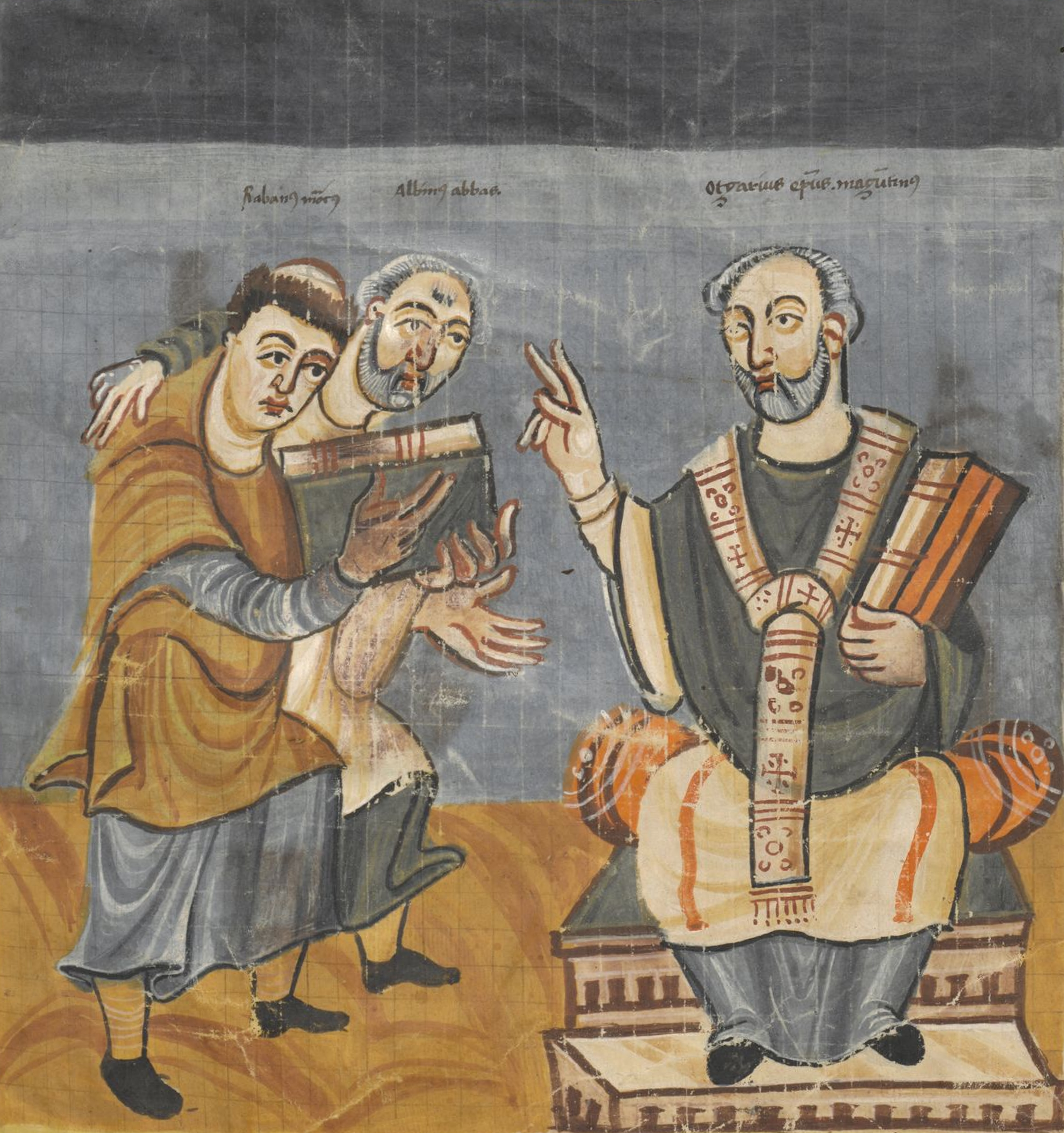"Raban Maur (left), supported by Alcuin (middle), dedicates his work to Archbishop Otgar of Mainz (Right); Carolingian Manuscript"
Alcuin was an Englishman who, after a period as monk and teacher at the great cathedral of York, served at the court of Charlemagne, whom he had met while returning from a visit to Rome. The Emperor recruited him to his court specifically because he recognised in him the potential to achieve a renaissance of learning and church reform. Note that the widely reproduced picture of him above, as well as another extant painting, shows him presenting books of learning.
We usually think of the "renaissance", as a rediscovery of classical thought, as dating from several centuries later, but in many respects he was an early precursor.
He kept copies of important works by the great Latin writers, and also explored many different fields of learning: in addition to theology, literature and poetry, he is also remembered for some notable mathematical problems he formulated, and which are still known today as popular diversions, such as an early version of the problem with transporting a wolf, a goat and a cabbage across a river. However, he was not known so much as an original thinker, but as a superb scholar, teacher and guide.
I warm to this image of Alcuin, as the kind of person I would like to be: one who collects and shares knowledge from a range of sources, digging into the past while looking for reform - and blending literature, theology and mathematics. (My degree is in mathematics, but I also have a deep love for books of all kinds, and worked for several years as a school librarian.)
The case for Alcuin's inclusion in a collection of queer saints does not rest on any known sexual adventures (he was after all a monk, and sworn to celibacy), but rather for the quantity of passionate letters he wrote to some (very) close clerical friends and pupils, and for some notable poetry. Alcuin is the third early saint and cleric that I know of whose poetry is represented in the Penguin Book of Homosexual Verse. (The others are Saints Paulinus of Nola, andVenantius Fortunatus.)
One of his poems which is widely quoted in this regard is about a departed cuckoo. At first reading, there is nothing particularly "gay" about this. The key, however, lies in understanding the background. This was written to one close pupil and friend about the recent departure of another - who is represented as the cuckoo. So this poem is in fact a description one man makes to a close male friend about the sense of loss and pain felt at the loss of another, mutual, friend. ("Daphnis" in line 20 is the pet name Alcuin used for the friend he is addressing in the poem. The departed friend, he referred to as "Dodo".)
Calendar of LGBT Saints"Lament for a Cuckoo"O cuckoo that sang to us and art fled,
Where'er thou wanderest, on whatever shore
Thou lingerest now, all men bewail thee dead,
They say our cuckoo will return no more.
Ah, let him come again, he must not die,
Let him return with the returning spring,
And waken all the songs he used to sing.
but will he come again? I know not, I.I fear the dark sea breaks above his head,
Caught in the whirlpool, dead beneath the waves,
Sorrow for me, if that ill god of wine
Hath drowned him deep where young things find their graves.
But if he lives yet, surely he will come,
Back to the kindly nest, from fierce crows.
Cuckoo, what took you from the nesting place?
But will he come again? That no man knows.If your love sings, cuckoo, then come again,
Come again, come again, quick, pray you come.
Cuckoo, delay not, hasten thee home again,
Daphnis who loveth thee longs for his own.
Now spring is here again, wake from thy sleeping.
Alcuin the old man thinks long for thee.
Through the green meadows go the oxen grazing;
Only the cuckoo is not. Where is her?Wail for the cuckoo, every where bewail him,
Joyous he left us: shall he grieving come?
let him come grieving, if he will but come again,
Yea, we shall weep with him, moan for his moan.
Unless a rock begat thee, thou wilt weep with us.
How canst thou not, thyself remembering?
Shall not the father weep the son he lost him,
Brother for brother still be sorrowing?Once were we three, with but one heart among us.
Scare are we two, now that the third is fled.
Fled is he, fled is he, but the grief remaineth;
Bitter the weeping, for so dear a head.
Send a song after him, send a song of sorrow,
Songs bring the cuckoo home, or so they tell
Yet be thou happy, wheresoe'er thou wanderest
Sometimes remember us, Love, fare you well.[trans. Helen Waddell, in Penguin Book of Homosexual Verse]
BBC/Ancient History
The Gay Love Letters of Medieval Clerics
And the ever valuable
John Boswell: Christianity, Social Tolerance, and Homosexuality

No comments:
Post a Comment